在日常学习、工作生活中,大家一定没少看到经典的手抄报吧,通过手抄报的制作能有效锻炼我们搜集信息、筛选信息的能力.那些被广泛运用的手抄报都是什么样子的呢?以下是小编精心整理的英语手抄报资料之新年快乐,欢迎阅读,希望大家能够喜欢。
英语手抄报资料之新年快乐
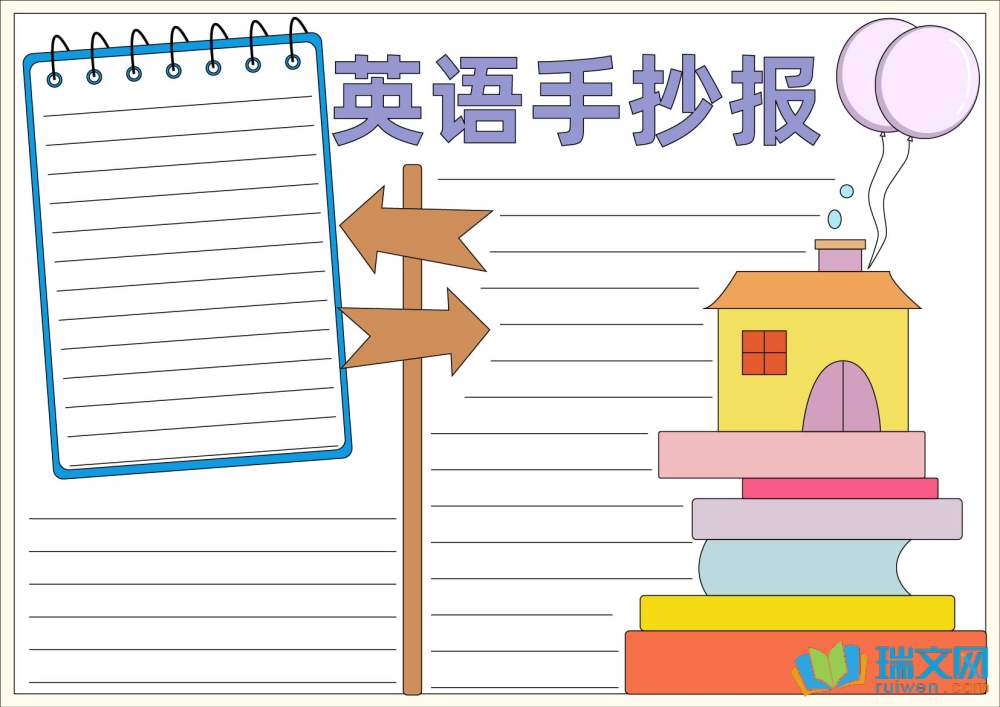
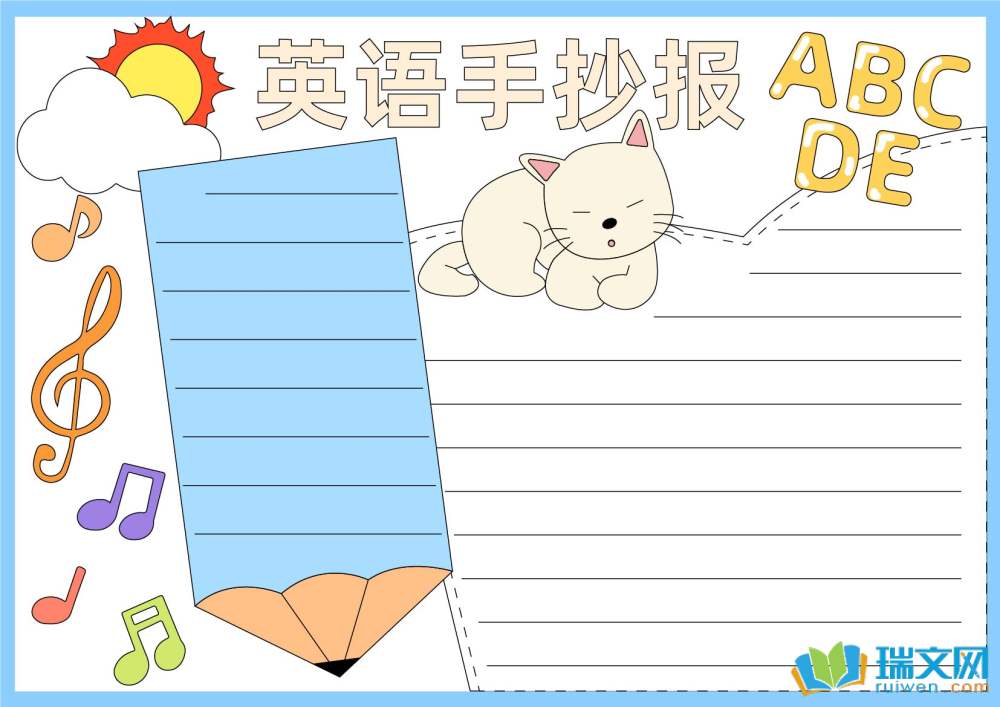
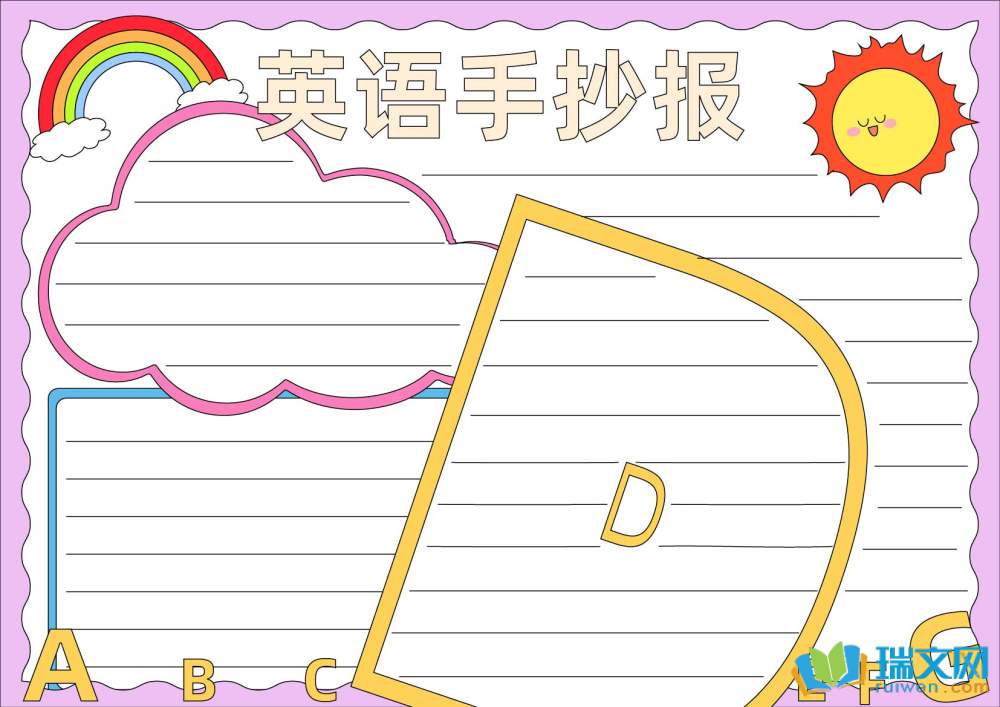
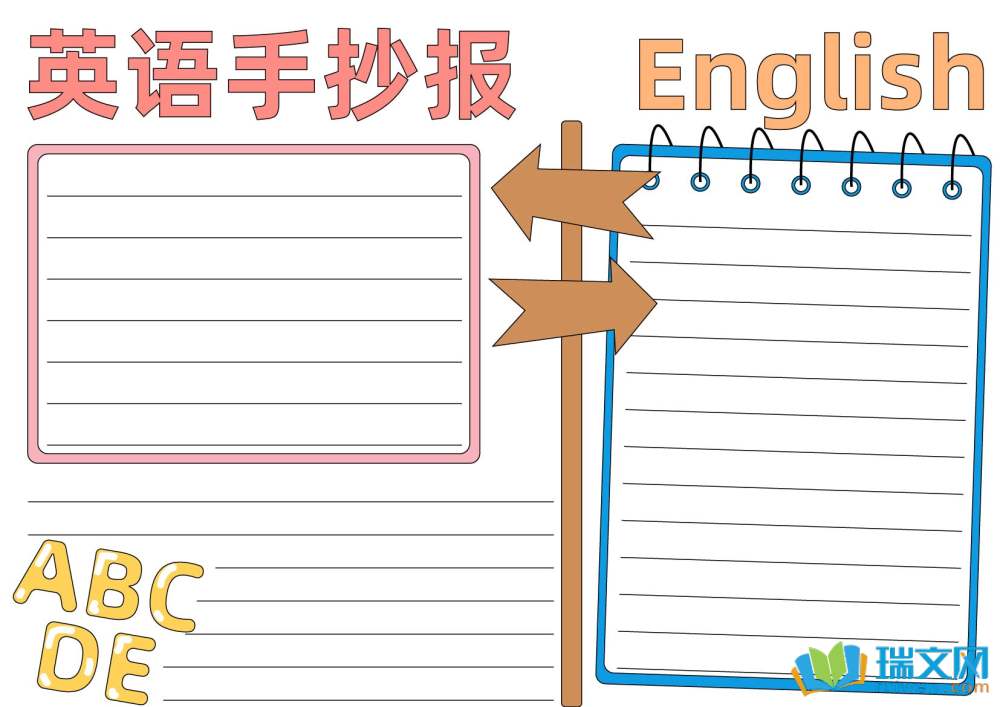
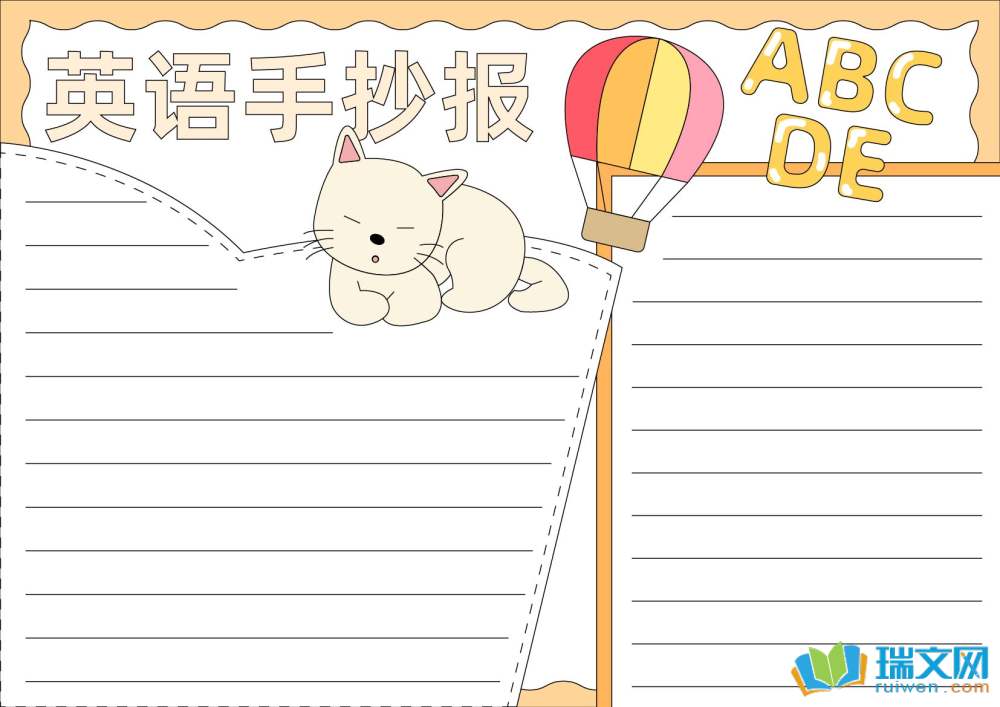
新年快乐英语作文
January 1st is New Years Day.
Its a great day for all the people throughout the world. As the saying goes, "A good beginning is half the battle". So, many people go all out to celebrate the important day. On that day, I went to the Book City with my classmates.
We bought a lot of useful reference books and interesting story books. I believe "Knowledge is power". I hope I can learn a lot from these books and improve my study. In the evening, my family had a big dinner party.
All the members in my family wished me a good luck in the new year.
春节祝福语
祝愿父母身体安康
I wish you longevity and health.
愿您福寿安康。
Wishing you a long life.
愿您长命百岁。
May you both live long and healthy lives.
愿二老福寿安康。
Wishing a happy, long and healthy life!
多福多寿!
祈祝爱情历久弥新
You are as refreshing as the upcoming spring.
春天就要来了,你就像春天一样清新可人。
I love you more with every passing year.
岁月流逝,我对你的爱历久弥新。
You are the most precious thing I have!
你是我最珍爱的宝贝!
Although I grow older every passing year, I am forever young when I am around you.
岁月已过,容颜已老。但有你在身旁,我将青春永不老。
祝愿同事步步高升
I hope there will be a promotion for you this year.
愿您今年步步高升。
Wishing you many future successes.
祝您今后获得更大成就。
Wishing you success in your career and a happy family!
祝您事业、家庭双丰收。
I wish you a joyous new year, happiness and good luck in the future.
祝新年快乐,并愿您幸福吉祥、前程似锦。
祈祝友人生意兴隆
Have a happy and prosperous year.
愿您新年快乐,大发利市。
Good luck in your new business.
恭贺开张大吉!
Best wishes for the success of your business.
祝您生意更加兴隆。
May good fortune come your way in the new year.
恭喜发财!
祝福常用语
Good luck, good health, good cheer. I wish you a happy New Year.
祝好运、健康、欢乐伴你度过一个快乐新年。
With best wishes for a happy New Year!
祝新年快乐,并致以良好的祝愿!
I hope you have a most happy and prosperous New Year.
谨祝新年快乐幸福,大吉大利。
With the compliments of the season.
祝贺佳节。
May the seasons joy fill you all the year round.
愿节日的愉快伴你一生。
Seasons greetings and best wishes for the New Year.
新年快乐、最诚挚的祝福。
To wish you joy at this holy season. Wishing every happiness will always be with you.
恭祝新年吉祥,幸福和欢乐与你同在。
Good health, good luck and much happiness throughout the year.
身体健康、万事好运、来年幸福满满!
May the joy and happiness around you today and always.
愿快乐幸福永伴你左右。
Please accept my sincere wishes for the New Year. I hope you will continue to enjoy good health.
请接受我诚挚的新年,顺祝身体健康。
Allow me to congratulate you on the arrival of the New Year and to extend to you all my best wishes for your perfect health and lasting prosperity.
恭贺新禧,祝身体健康、事业发达。
Best wishes for the holidays and happiness throughout the New Year.
恭贺新禧,万事如意。
With very best wishes for your happiness in the New Year.
致以最良好的,原你新年快乐幸福。
May the coming New Year bring you joy, love and peace.
愿新年为你带来快乐,友爱和宁静。
Wishing you happiness during the holidays and throughout the New Year.
祝节日快乐,新年幸福。
Seasons greetings and sincere wishes for a bright and happy New Year!
献上节日的问候与,愿你拥有一个充满生机和欢乐的新年。
I give you endless brand-new good wishes. Please accept them as a new remembrance of our lasting friendship.
给你我无尽的新的,让它们成为我们永恒友谊的新的纪念。
Good luck and at success in the coming New Year.
祝来年好运,并取得更大的成就。
A beautiful wish to you and your family --- live a happy life and everything goes well.
给你和你的家人最美好的祝愿——生活幸福、万事如意!
Allow me to congratulate you on the arrival of the New Year and to extend to you all my best wishes for your perfect health and lasting prosperity.
恭贺新禧,祝身体健康、事业发达。
Good luck and great success in the coming New Year.
祝来年好运,并取得更大的成就。
I hope you have a most happy and prosperous New Year.
谨祝新年快乐幸福,大吉大利。
春节简介
Chinese Spring Festival, also called Lunar New Year, has more than 4,000 years of history. Being one of the traditional Chinese festivals, it is the grandest and the most important festival for Chinese people. It is also the time for the whole families to get together, which is similar with Christmas Day to the westerners. Originating during the Shang Dynasty (about 17th - 11th century BC), Spring Festival, which celebrates family reunion, is full of rich and colorful activities, and hopes with the advent of spring and flowers blossoming. People from different regions and different ethnic groups celebrate it in their unique ways.
中国的春节,也被称为农历新年,迄今已有四千多年的历史。对于中国人来说,这是规模最大,最重要的传统节日。就如同西方的圣诞节一样,春节是一家团聚的日子。春节起源于商朝(公元前11-17世纪),为了庆祝全家团圆和表达对春暖花开的期盼,节日期间会准备丰富多彩的活动。不同地区和不同少数民族人们会用自己独特的方式庆祝这一传统节日。
节日时长
It comes on the first day of Chinese lunar calendar and lasts for almost half of a month. But in folk custom, this traditional holiday lasts from the 23rd day of the twelfth month to the 15th day of the first month (Lantern Festival) in the lunar calendar. Among these days, the New Year’s Eve and the first day of the New Year is the peak time. The exact days are different in every year according to the lunar calendar.
春节从农历新年第一天开始,几乎要持续一整个月。但在民间传统中,这一节日从腊月23日就开始了,直到正月十五(元宵节)。在这些天里,除夕和春节第一天是最热闹的`时候。根据农历,每年除夕和春节所在的公历日期都有所不同。
春节由来
It is said that the custom of Spring Festival started in when people offered sacrifice to ancestors in the last month of Chinese lunar calendar. At that time, people prepared the sacrifice by doing thorough cleaning, having bathes and so on. Later, people began to worship different deities as well on that day. It is the time that almost all the farm works were done and people have free time. The sacrificing time changed according to the farming schedule and was not fixed until the Han Dynasty (202BC-220AD). The customs of worshipping deities and ancestors remains even though the ceremonies are not as grand as before. It is also the time that spring is coming, so people held all kinds of ceremonies to welcome it.
据说,春节起初源于人们在农历腊月祭祀先祖,在那期间,人们为了祭祀会做大扫除,沐浴换衣等等。后来人们开始在那一天敬奉神明。春节期间正好各种农耕活动结束,人们有空余时间。最开始的祭祀日期由于农耕活动并不固定,直到汉朝(公元前202年-公元220年)才固定下来。祭祀神明和先祖的传统延续下来,但并不像以前那样浩大。春节也是春天的开始,所以人们会举办各种仪式迎接春天的`到来。
春节传说
There are many legends about Spring Festival in Chinese culture. In folk culture, it is also called “guonian” (meaning “passing a year”). It is said that the “nian” (year) was a strong monster which was fierce and cruel and ate one kind of animal including human being a day. Human beings were scared about it and had to hide on the evening when the “nian” came out. Later, people found that “nian” was very scared about the red color and fireworks. So after that, people use red color and fireworks or firecrackers to drive away “nian”. As a result, the custom of using red color and setting off fireworks remains.
中国文化中有很多关于春节的传说。在传统文化中,春节亦被称为“过年”。传说“年”是一种凶猛异常的怪物,每天都会吃一种动物(包括人)。人们非常惧怕他,当“年”夜间出来活动时,人们会找地方躲起来。后来,人们发现“年”非常害怕红色和爆竹,于是,人们用红色和鞭炮来驱赶“年”。久而久之,春节用大红色和放鞭炮的习俗就保留了下来。
春节活动
Preparing the New Year starts 7 days before the New Year’s Eve. According to Chinese lunar calendar, people start to clean the house on Dec. 24, butcher on Dec. 26th and so on. People have certain things to do on each day. These activities will end Jan. 15th of the lunar calendar.
新年的准备工作在除夕前的七天就开始了。根据中国农历,人们从腊月二十四开始打扫屋子,二十六日杀猪宰羊等等。每一天都有不同的活动,所有这些活动将在正月十五结束。
传统习俗
Every family does a thorough house cleaning and purchases enough food, including fish, meat, roasted nuts and seeds, all kinds of candies and fruits, etc, for the festival period. Also, new clothes must be bought, especially for children. Red scrolls with complementary poetic couplets, one line on each side of the gate, are pasted at every gate. The Chinese character Fu is pasted on the center of the door and paper-cut pictures adorn windows.
过年期间,每家每户都会做大扫除,购买丰富的食物,包括鱼肉坚果,水果糖果等。另外,春节必须买新衣服,尤其是给小孩子购买。门上贴上新对联和福字,窗户上还要贴上窗花。
春节禁忌
The Spring Festival is a start for a new year, so it is regarded as the omen of a year. People have many taboos during this period. Many bad words related to “death”, “broken”, “killing”, “ghost” and “illness” or “sickness” are forbidden during conversations. In some places, there are more specific details. They consider it unlucky if the barrel of rice is empty, because they think they will have nothing to eat in the next year. Taking medicine is forbidden on this day, otherwise, people will have sick for the whole year and take medicine constantly.
春节是新的一年的开始,预示着一年的运气,所以过年期间有很多禁忌,比如“死”“破”“杀”“鬼”“病”这类字眼是谈话中要避免的`。在某些地方还有一些特殊的禁忌,比如新年米缸空了不是好兆头,因为这预示着新的一年将没东西吃,春节那天也不能吃药,这会预示着新的一年疾病产生,医药不断。
节日美食
Food during this happy event has its characteristics, which is the representative of Chinese festival food culture. Dumplings and the reunion dinner are indispensable at this time. Cold and hot dishes are all served. Fish is always an important dish then, which expresses people’s hope of having a wealthy year.
春节期间的食物也很有特色,代表着中国传统饮食文化,饺子和团圆饭是不可或缺的,冷盘热菜都得上,鱼也是春节一道重要的菜肴,它代表了人们年年有余的期望。
- 相关推荐